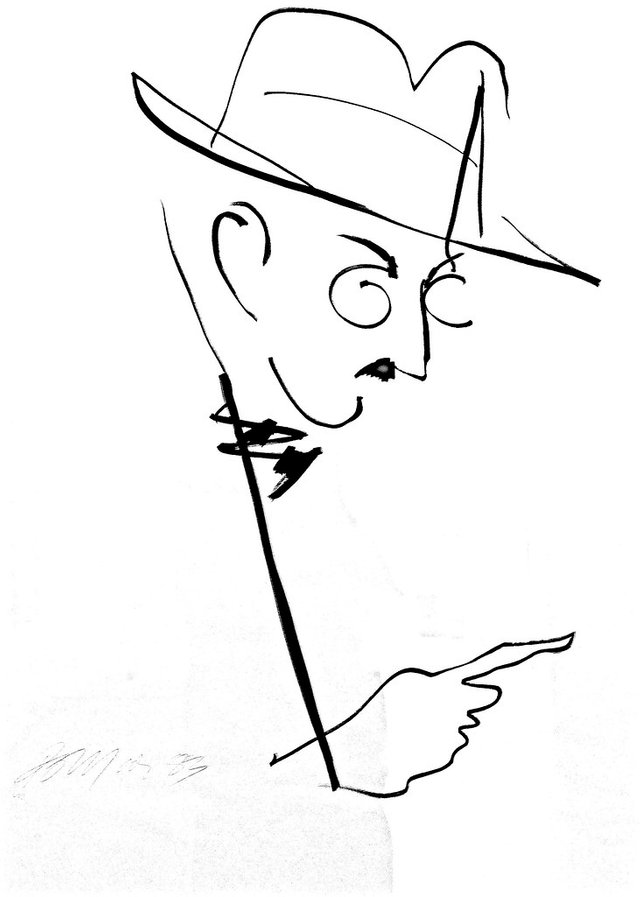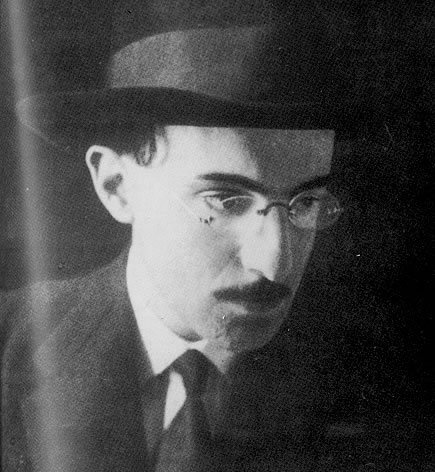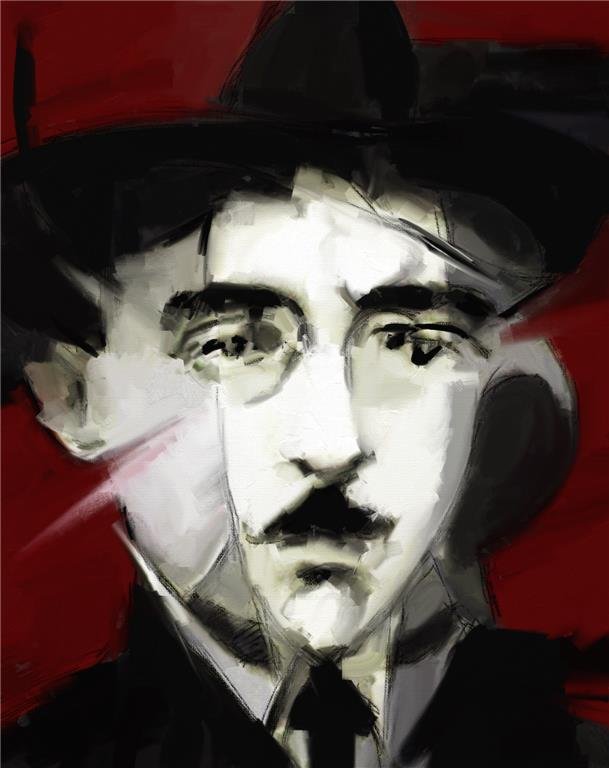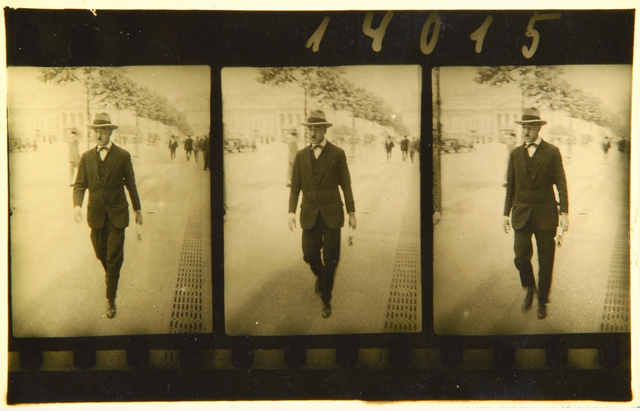
Poet, writer, literary critic, translator, publisher and philosopher, Fernando António Nogueira Pessoa is considered, alongside Luís de Camões, the greatest Portuguese poet and one of the greatest in universal literature. Although born in Lisbon on June 1888, Pessoa lived in South Africa from eight to seventeen years old, and received his early education at St. Joseph Convent School, and later in Durban High School where he became fluent in English and developed an interest in English literature.
I'd woken up early, and I took a long time getting ready to exist.
His best-known poems were signed by the heteronymous Álvaro de Campos, Ricardo Reis, Alberto Caeiro, as well as a semi-heteronymous, Bernardo Soares, who would be Pessoa himself, a bookkeeper helper and author of 'The Book of Disquiet', one of the founding works of Portuguese fiction in the 20th century. But Pessoa's heteronyms, pseudonyms, and characters were many, about 75, and the earliest heteronym Chevalier de Pas emerged at the age of six. More than mere pseudonyms, his heteronyms were complete characters, with their own biographies and divergent literary styles.
My soul is a hidden orchestra; I do not know what instruments, what violins and harps, drums and tambours, sound and clash inside me. I know myself only as a symphony." (The Book of Disquiet)
Robert Hass, an American poet, says: "other modernists like Yeats, Pound, Elliot invented masks for which they spoke occasionally ... Pessoa invented whole poets." [Source]

Pessoa wrote on the heteronyms: How do I write in the name of these three? Caeiro, through sheer and unexpected inspiration, without knowing or even suspecting that I’m going to write in his name. Ricardo Reis, after an abstract meditation, which suddenly takes concrete shape in an ode. Campos, when I feel a sudden impulse to write and don’t know what. (My semi-heteronym Bernardo Soares, who in many ways resembles Álvaro de Campos, always appears when I'm sleepy or drowsy, so that my qualities of inhibition and rational thought are suspended; his prose is an endless reverie. He’s a semi-heteronym because his personality, although not my own, doesn’t differ from my own but is a mere mutilation of it. He’s me without my rationalism and emotions. His prose is the same as mine, except for certain formal restraint that reason imposes on my own writing, and his Portuguese is exactly the same – whereas Caeiro writes bad Portuguese, Campos writes it reasonably well but with mistakes such as "me myself" instead of "I myself", etc.., and Reis writes better than I, but with a purism I find excessive...)
Álvaro de Campos, for example, was a Portuguese engineer with English education and strongly influenced by symbolism and futurism. Ricardo Reis was a medical advocate of the monarchy with great interest in Latin culture. Alberto Caeiro, although with little formal education and an anti-intellectualist position (with only primary school), is considered a master. With a straightforward language and the naturalness of oral speech, it is the most fruitful among heteronyms.
His works and 'personalities' are an enigmatic labyrinth
I am nothing. I'll never be anything. I couldn't want to be something. Apart from that, I have in me all the dreams in the world.
As a mystic, he was an enthusiast of esotericism, occultism, hermeticism, numerology, astrology, and alchemy. He also paid close attention to neopaganism, theosophy, Rosicrucianism, and freemasonry, which strongly influenced his literary work. Pessoa's interest in occultism led him to correspond with the infamous Aleister Crowley and eventually helping Crowley to forge a fake suicide when Crowley visited Portugal in 1930 and also wrote on several fragments of Crowley's doctrine of Thelema. He wrote an article entitled "Secret Associations", where he defended Freemasonry, as well as numerous fragments, left unpublished, regarding the controversy that the article generated in the press.

Pessoa was also an inventor, entrepreneur, business correspondent, and political commentator
The value of things is not the time they last, but the intensity with which they occur. That is why there are unforgettable moments and unique people!
In 1935, the last year of his life, Fernando Pessoa wrote a series of political writings, several of them against Salazar and the Estado Novo but Salazarist censorship did not let it pass. Pessoa in his political writings, various anti-Catholic texts and poems clearly defined himself as an opponent not only of Salazarism but also of fascism and criticized the growing influence of the Church on Portuguese politics. Pessoa's at the end of his life committed himself to the defense of human freedom and dignity, which he then considered threatened, both in Portugal and in the rest of the world.
If after I die, people want to write my biography, there is nothing simpler. They only need two dates: the date of my birth and the date of my death. Between one and another, every day is mine.
On November 29 of 1935, Fernando Pessoa is hospitalized and diagnosed with hepatical cirrhosis and dies the next day. Pessoa’s inventiveness and geniality as a writer touch various aspects of human life, such as happiness, contentment, failure, solitude, yearning, hope, regret, dreams. Pessoa's popularity began after his death, and his poetry only piqued public interest after 1940. In 2008, The International Bureau of Cultural Capitals acknowledges Fernando Pessoa as one of the 50 most influential personalities in European culture, alongside Da Vinci, Mozart, and Einstein. After eighty-four years his death, the vast literary world of Pessoa's is not completely inventoried by scholars, and an important part of his prose works still awaits publication.
Now, having seen everything and felt everything, I have a duty to close myself at home in my spirit and to work, as much as I can and in all that I can, for the progress of civilization and the widening of the consciousness of humanity.
Curious facts about the eccentric Fernando Pessoa
(: Pessoa means Person in English :)
- He couldn't see a blunt pencil and kept the habit of writing standing.
- Arriving a few hours late in a meeting with the Portuguese writer José Régio, the poet declared to be Álvaro de Campos and apologized for Fernando Pessoa not being able to attend the meeting.
- He had a habit of making astral charts of historical events, friends, relatives, acquaintances, and even of famous personalities.
- Some say he was responsible for introducing the planet Pluto (recently downgraded to the dwarf planet category) in the astrological charts.
- He could not stand to be photographed, disliked to speak on the phone, and was terrified of thunders.
- Fernando died of liver cirrhosis. However, on his death certificate, there is “intestinal obstruction” as the cause of death.
- His last words were written in pencil on the eve of his death:
I do not know what tomorrow will bring.

The first two links are in Portuguese, but if you visit the website of the 'House Fernando Pessoa' and the 'Private Library Catalog' you can choose the English version. All quotes are from Pessoa's writings.
https://www.casafernandopessoa.pt/en/fernando-pessoa
http://bibliotecaparticular.ca...a.pt/index/index.htm
This article is my original work and was first posted somewhere else.
This post had received 5.00% upvote from @steemitportugal account!

Vote for @steemitportugal to Witness. Your vote is very important to us!
Visit our WebSite www.steemitportugal.com (tutorials,news...)
Thank you very much.
Click here to vote
Delegation for daily voting: 10SP-25SP-50SP-100SP-250SP-500SP-1000SP
Downvoting a post can decrease pending rewards and make it less visible. Common reasons:
Submit